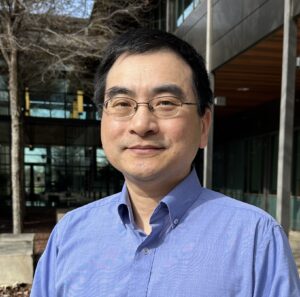SAN ANTONIO (Feb. 19, 2024) — Texas Biomedical Research Institute (Texas Biomed) welcomes immunologist and chemical biologist Shouxiong Huang, Ph.D., as Associate Professor to its faculty.
Dr. Huang specializes in the small and unusual parts of the human immune system, with a singular goal propelling his research.

“We want to find new cellular and molecular targets to help fight diseases, such as tuberculosis and cancer,” says Dr. Huang, who joined Texas Biomed in January 2024.
Specifically, he studies metabolites – molecules smaller than proteins that assist a wide array of functions throughout the body. For example, without metabolites, certain immune cells would not be triggered to recognize specific pathogens, a necessary step to fight infection. Many B vitamins and hormones also fall into the metabolite category.
Scientists have been studying metabolites for more than 100 years. But it wasn’t until highly sensitive and accurate mass spectrometers became available within the last 30 years or so that metabolites could be efficiently analyzed, with hundreds to thousands of the molecules present in a single sample.
“Mass spectrometers allow us to study which metabolite interacts with a protein or DNA and influences a biological process,” Dr. Huang says. “We are learning how metabolites play very important roles in many different processes.”
Dr. Huang also studies a group of T cells that don’t behave like most other T cells. Usually, T cells, which are a type of white blood cell, need weeks to begin fighting off an infection. Unconventional T cells, on the other hand, respond within days.
While conventional T cells are unique to individuals based on their past illnesses, unconventional T cells appear to be similar across populations.
“I am working to identify specific metabolites that can activate unconventional T cells to fight infections,” Dr. Huang says. “Because these cells are conserved across populations, we hypothesize that activating them could work as an alternative to combine with other immunotherapies and help fight different bugs.”
After 10 years working and teaching at the University of Cincinnati, Dr. Huang is excited to join Texas Biomed.
“The last few years, I have been more focused on developing basic technology and ways to detect functional responses of small molecules and T cells,” Dr. Huang says. “Texas Biomed has a research environment that supports translational studies and innovation.”
He is also looking forward to sharing his expertise in mass spectrometry as the Institute adds this technology to its core lab services.
“The recruitment of Dr. Huang to Texas Biomed demonstrates our continued commitment to recruit top talent and build strength areas within our campus, aligning those recruitment goals closely with our Strategic Plan,” says Joanne Turner, PhD, Texas Biomed’s Executive Vice President for Research.
Dr. Huang notes he is prepared for living in Texas, having grown up in a hot environment along the southeastern coast of China.
His interest in science began at a very early age. His father and the five generations before him were all traditional medicine doctors. Planning to follow in their footsteps, Dr. Huang attended the Beijing University of Traditional Chinese Medicine. However, he became fascinated studying how herbal medicines worked on the molecular and cellular levels – showing exactly how they interacted with the body.
“Herbal medicine metabolites are some of the most complex structures to study,” he says. “Pharmaceuticals, you know exactly what is in them. But in mixtures of plants with immune regulatory effects, there are so many different compounds and many are unknown.”
He remained focused on the immune system, going on to earn a Ph.D. in molecular microbiology and immunology from the Department of Veterinary Preventative Medicine at The Ohio State University. He completed postdoctoral fellowships at the Washington University School of Medicine in St. Louis and the Brigham and Women’s Hospital at Harvard Medical School.
He received an R01 grant from the National Institutes of Health last year to study metabolites and unconventional T cells in tuberculosis infection.
“Texas Biomed is a going to be a great place to continue this work with so many other TB researchers at the Institute to collaborate with,” Dr. Huang says. “I am also looking forward to the opportunities to investigate metabolites in pre-clinical models of TB as well as patients living with TB.”